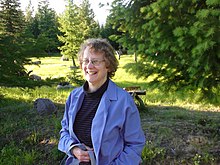Sarah Thomason
Sarah Grey Thomason | |
|---|---|
 Thomason in July 2012 | |
| Born | 1939 (age 84–85) |
| Parent | Marion Griswold Grey (mother) |
| Awards | Wilbur Cross Medal |
| Academic background | |
| Alma mater | |
Linguist | |
| Institutions | |
| Website | www-personal |
Sarah Grey Thomason (known as "Sally") is an American scholar of
Career
Early career
Sarah Thomason received a
Thomason had a great interest on learning how to do fieldwork about
Current Work
Sarah Thomason is also known for her contributions to the study of
Sarah Thomason believes language change could be a product of deliberate action driven by its speakers, who may consciously create dramatic changes in their language, if strong motivation is present.[3] This view challenges the current assumption in historical linguistics that, on one hand, deliberate language change can only produce minor changes to a language, and, on the other, that an individual on his or her own is not able to produce language change. While she admits that the permanence of the change is dependent on social and linguistic probability, she emphasizes these factors do not invalidate the possibility of permanent change occurring. Thomason argues that under a situation of language contact bilingual speakers can adapt loanwords to their language structure, and that speakers are also capable of rejecting changes to the structure of their language. Both of these cases show conscious and deliberate actions from the part of the speakers to change their language.[6]
Sarah Thomason has also criticized alleged cases of
She is one of the Language Log bloggers.[9]
Honors
Thomason is a prolific contributor to academic journals and publications specializing in the field of linguistics, as well as a guest lecturer at different universities around the world and a speaker at international conferences.[7]
From 1988 to 1994 she was the editor of
She is currently an associate editor for the Journal of Historical Linguistics,[12] as well as part of the advisory board of the Journal of Language Contact.[13]
Personal
She is married to philosopher/computer scientist Richmond Thomason and is the mother of linguist Lucy Thomason. Her mother was the ichthyologist Marion Griswold Grey.
Bibliography
- Thomason, Sarah G. and ISBN 0-520-07893-4.
- Thomason, Sarah G. (2001). Language contact: an introduction. Georgetown University Press, 2001.[14]
- Thomason, Sarah G. (2015). Endangered Languages: An Introduction. Cambridge University Press, 2015.[15]
- Thomason, Sarah G. (1987) Past tongues remembered? The Skeptical Inquirer. Committee for Skeptical Inquiry. 11:367-75
- Thomason, Sarah G. (1984) Do you remember your previous life's language in your present incarnation?. American Speech. Duke University Press. 59:340-350.
References
- ^ "Sarah Thomason | U-M LSA Linguistics". lsa.umich.edu. Retrieved 2022-12-31.
- ^ a b c d e f g h "Sarah Thomason's Brief CV" (PDF). Retrieved 3 October 2014.
- ^ a b c d e "Sarah Thomason, University of Michigan". The Linguist List. Retrieved 3 October 2014.
- ^ University of Michigan faculty directory
- ISSN 2333-9683.
- ^ "Language Contact and Deliberate Change" (PDF). Retrieved 12 October 2014.
- ^ a b "Curriculum Vitae of Sarah G. Thomason" (PDF). Retrieved 13 October 2014.
- ^ "Xenoglossy" (PDF). Retrieved 12 October 2014.
- ^ "About". Language Log. Retrieved 3 October 2014.
- ^ "LSA Fellows By Name | Linguistic Society of America". www.linguisticsociety.org. Retrieved 2022-12-31.
- ^ "Presidents | Linguistic Society of America". www.linguisticsociety.org. Retrieved 2022-12-31.
- ^ "Journal of Historical Linguistics". John Benjamins Publishing Company. Retrieved 3 October 2014.
- ^ "Journal of Language Contact". Brill. Retrieved 3 October 2014.
- ISBN 0-87840-854-1
- ISBN 9780521865739
